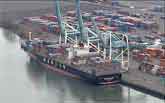In a flurry of legal activity, South Korea's Hanjin Shipping, the world's seventh largest container carrier by capacity, filed for bankruptcy protecting in its home country last, causing something of a panic in global shipping and more filings in other countries where Hanjin operates.
Hanjin plans to file for court protection this weekin about 10 countries, including the US, Canada, Germany and the UK, and later expand that to 43 jurisdictions to protect its ships and other assets from being seized by creditors, South Korea's Financial Services Commission said on Monday.
Supply Chain Digest Says... |
 |
| "Many shippers will be unaware that when they book with carrier Y that their container will actually have been moved on a Hanjin-operated vessel," Drewry says. |
 |
What do you say? |
| Click here to send us your comments |
 |
| Click here to see reader feedback |
|
|
This is key, because a number of Hanjin ships have been seized by creditors or turned away from ports, with terminals refusing to work with the company's cargo for fear they won't get paid, leaving retailers and others unable to get their goods.
If Hanjin receives bankruptcy protection it should be able to get ships back to into the ports and see its containers unloaded.
"No one is booking anything on Hanjin's ships, and the ships aren't moving. The cargo on them is stuck. It's just a complete mess, and I think it's going to take a long time to sort that out, even to just to get the cargo released," said Greg Knowler, a shipping consultant at HIS Markit Maritime & Trade.
It appears that currently 79 Hanjin ships worldwide have been denied port access already, made up of 61 container ships and 18 bulk carriers.
Meanwhile, Chinese ports and terminals that accepted Hanjin ships before the company announced bankruptcy proceedings are charging container-handling deposits of as much as $1,800, say freight agents. Seven Hanjin ships remain stranded outside Chinese ports.
Hanjin Shipping is a unit of Hanjin Group, which is the country's 10th-largest conglomerate and also controls Korean Air Lines.
Hanjin's bankruptcy filing has sent spot shipping rates soaring, by as much as 40% on routes from Asia to the Americas, according to Drewry Shipping.
But the long-term impact could be even greater. The global shipping industry, both container ships and bulk, have been struggling financially, as global trade volumes slowed dramatically following the Great Recession in 2008-09, while until just recently carriers continued to add capacity far above the growth in volumes, sending rates plummeting.
For example, in 2009 when the container industry posted operating losses of nearly $20 billion and many lines were said to be minutes from bankruptcy, none actually went under. The "zombie carriers'" survival methods were varied and complex, ranging from off-hiring ships to requesting government support, but ultimately those tactics worked.
(See More Below)
|
CATEGORY SPONSOR: SOFTEON |
|
|
| |
|
|
 "Having survived the worst crisis the industry has ever faced the assumption grew in strength that major carriers could not be killed off," Drewry wrote last week. While over the past decade or so a few smaller, not especially consequential container carriers have left the market, there hasn't been anything close to the scale of the Hanjin crisis. "Having survived the worst crisis the industry has ever faced the assumption grew in strength that major carriers could not be killed off," Drewry wrote last week. While over the past decade or so a few smaller, not especially consequential container carriers have left the market, there hasn't been anything close to the scale of the Hanjin crisis.
"Hanjin's move into administration shatters the complacency that major carriers are immune to failure and can stomach prolonged years of low rates and financial losses," Drewry added. "It was this complacency that blinded most to the very real possibility of Hanjin's demise."
So, despite well-known deep financial troubles, shippers continued to book freight on Hanjin, though certainly much of that related to exports from South Korea, but certainly not all. In fact, since 2013, Drewry Financial Research Services has warned that Hanjin was dangerously leveraged and living on borrowed time.
But with today's complex container movements and alliance relationships, an importer or exporter could see their freight moving on a Hanjin ship even though the move was booked with another carrier, meaning that freight could also be stuck.
"Many shippers will be unaware that when they book with carrier Y that their container will actually have been moved on a Hanjin-operated vessel," Drewry says.
Perhaps the most far-reaching consequence of Hanjin's situation, alongside the recent defensive M&A activity in the container shipping sector, will be that all stakeholders will now finally understand that carriers cannot survive on a diet of ultra-low freight rates if they want to see healthy competition.
"The impending bankruptcy of Hanjin should serve as a warning that carriers do have breaking points and that they will not always be rescued," concludes Drewry. "Unless shippers make the altruistic decision to pay more to save carriers (unlikely) they will need to pay more attention to the warning signs."
Do you think more container carriers will go under? What should global shippers do? Let us know your thoughts at the Feedback section below.
Your Comments/Feedback
|